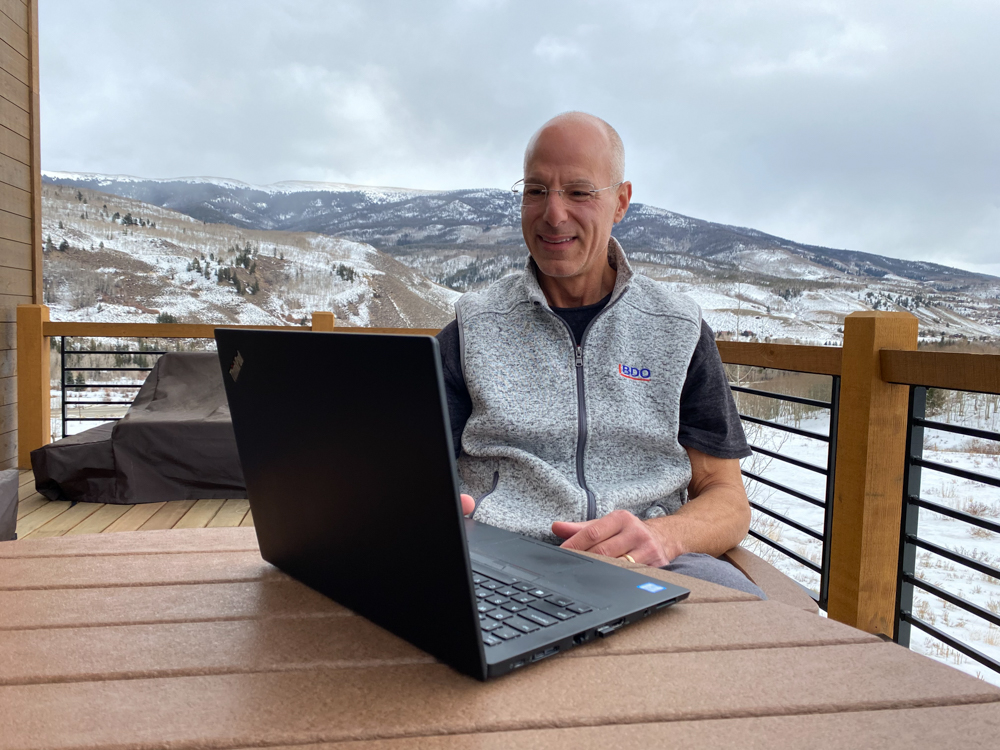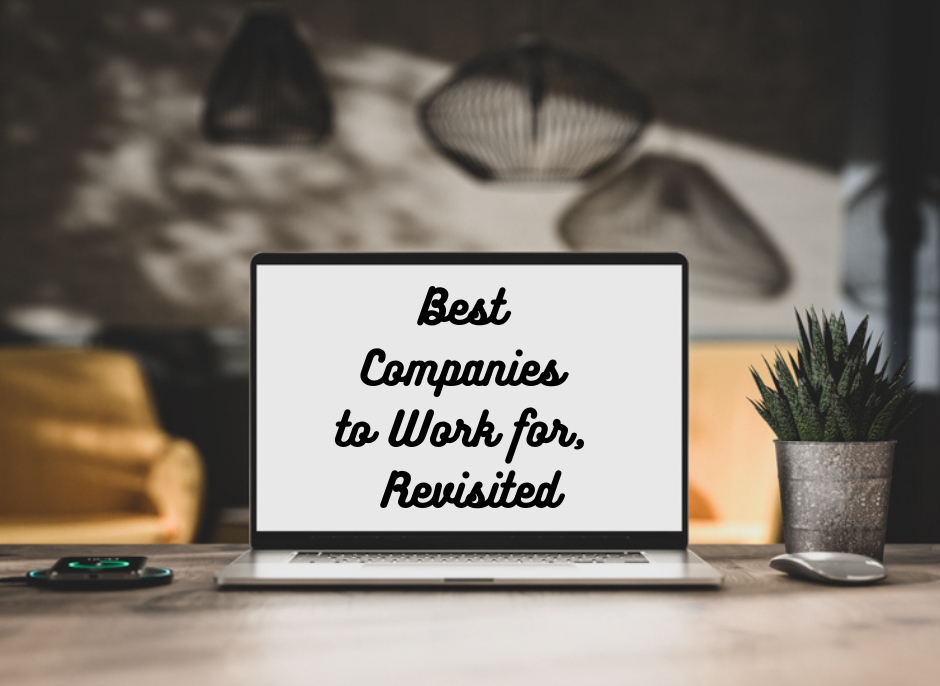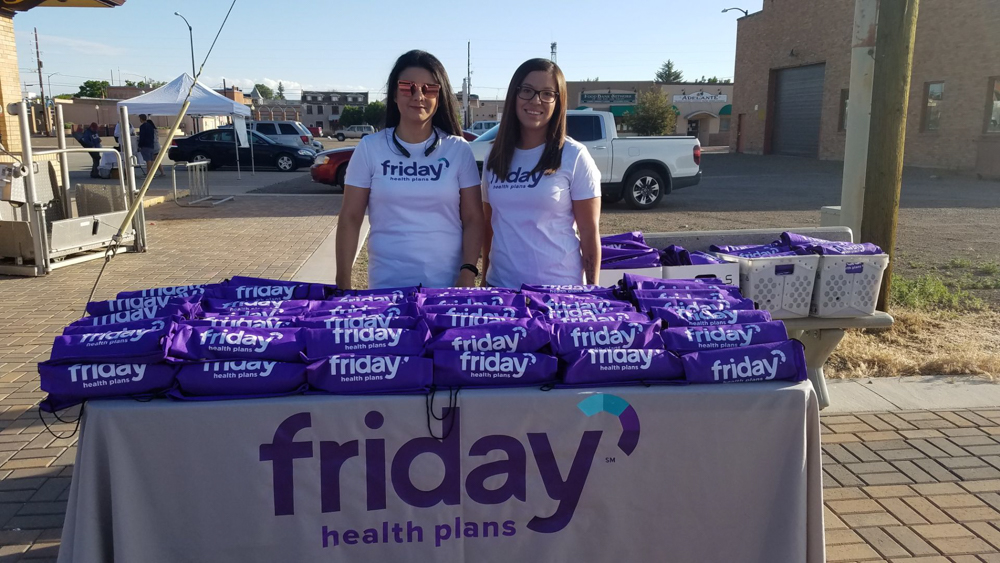Even the workplaces with the most innovative employee perks and engaged employees had to rethink their human resources strategies last year. Less than three months after ColoradoBiz presented the list of winners and finalists of Best Companies to Work For in Colorado, the COVID-19 crisis changed the business landscape. Workplaces closed, stay-at-home orders were issued, and people set up their laptops on their dining tables and learned how to use Zoom.
Exemplary companies that boasted pet-friendly offices, volunteer days and free snacks had to shift their focus to other benefits if people were working from home, or in some cases, laid off or furloughed. Employers had to rethink what is a workplace, and how to keep employee morale up when the news is depressing and people feel isolated.
Here is how last year’s honorees–those that remained intact and responded to interview requests–adapted their business models, took care of employees and prepared for a post-pandemic world.
Small Companies
WINNER
Adperio Inc.
Denver
Assessing how Adperio has coped with COVID-19 is difficult because of changes the firm has undergone since winning last year’s workplace award for small companies. Adperio is now part of Perform, a performance marketing firm based in Sarasota, Florida. The firm helps marketers maximize their ROI by paying only for customers acquired, instead of simply impressions or clicks. Perform announced a rebranding in February last year, saying it was uniting Clickbooth, Adperio and IgniteOPM into a global brand. At the time, Perform said it had more than 135 employees across the globe from North America to Europe but did not respond to requests for an interview regarding workplace adaptations brought on by COVID-19.
Finalist
Magneti
Denver
The revenue model didn’t change for the digital marketing agency Magneti. “Most of our clients work in industries that were not heavily impacted,” says Ben Robb, vice president of brand. “What did change was the messaging of the content.” The firm helped clients to revise communications schedules, deliver products and services digitally, and promote the fact that the companies had made those pivots.
Although the firm maintained the same staffing level of approximately 16 people, the challenge became how to keep employees engaged when everyone had to shift to working remotely. One solution was to host “quarantini happy hours,” or monthly social Zoom meetings that involve games and activities. There are also occasional voluntary lunchtime Zoom meetings. On a more serious note, one member of the Magneti team has been hosting regular conversations on mental health. “That’s always relevant in the workplace, especially at an agency where deadlines and workloads can feel intense for extended periods, but it’s a bigger part of our regular dialog now,” Robb says. “You can’t share and process stress without connection. We’re trying to create a consistent space for that sharing.”
Brainstorming has also gone virtual, and the team uses Google Jamboards, which are digital whiteboards. Training is still important, but now employees attend educational conferences online. Real estate will change as Magneti’s offices in Denver and Colorado Springs have been unoccupied lately, and the firm will rethink the future of those spaces.
The shift to digital communications also affected Magneti’s hiring and onboarding processes. “COVID gave us the opportunity to document our processes in greater detail than we ever had before,” Robb says. “We had to write things down in order to convey them fully. We had to be more meticulous because we couldn’t be there in person.”
The crisis also inspired employees to take on new tasks. “Employees stepped up and said, ‘I want to take this on,’” says Kyle Morrison, sales director. “It wasn’t a year of moping around. We pride ourselves in the quality of people that come, and that stay.”
Magneti even managed to win new business. “We grew a little bit,” Morrison says. “I think that really speaks to the type of place we have here.”
Finalist
Apostrophe Inc.
Denver
Health benefits platform Apostrophe is a fast-growing company, which means hiring had to continue even as in-person interviews were paused. That created an unusual dynamic. “At one point in October we were having an all-hands call,” says co-founder and CEO Cheryl Kellond. “I realized 20% of the people on the call were hires we made after the pandemic. They had never met.”
They also did not necessarily live in Denver. Many of Apostrophe’s 60 or so employees work remotely from other cities, states, even countries, as Apostrophe tapped into a larger pool of applicants. The ability to work remotely, once considered a perk, gave Apostrophe the flexibility to find talent everywhere. “It was a huge boost to what we have been able to do from a product and engineering side,” Kellond says.
The other positive of working from home: Leaders were able to demonstrate that they understand the challenges of handling family and work matters from home. “I heard from folks that it makes it easier to ask for flexibility,” Kellond says. “The world doesn’t end when a kid jumps on their lap during a call.” Apostrophe even rolled out a new perk, a $200 monthly stipend for working from home, so workers can buy headphones or pay for faster internet.
The challenge is that it’s hard to build cohesion. Informal brainstorming sessions, quick conversations, even practical jokes play an important role in bringing a team together. Kellond says some mid-level leaders are trying to recreate this atmosphere by organizing socially distanced, dog-friendly meetings in parks and hosting online events. “The spontaneity and serendipity of the workplace is so important to their lives,” she says.
On the plus side, there have been cost savings, and the money reallocated. Sales staffers are not traveling to meet with customers during the pandemic, so the travel budget was put toward marketing and sales technology. Demand generation is now digital and online, and Apostrophe has smart data about who its best customers are. “The verdict is still out on how it’s really going to pay off over time,” Kellond says. “It’s a change for our industry.”
According to SBA.gov, Apostrophe received a Paycheck Protection Program loan of between $350,000 and $1 million in April 2020.
Mid-Sized Companies
WINNER
Merritt Aluminum Products
Fort Lupton
The leadership at Merritt Aluminum Products looks to its five core values – integrity, trust, excellence, respect and teamwork – when making decisions. That was especially true as the COVID-19 crisis began. “In a time of tremendous uncertainty and disruption, keeping those values at the center of the business worked well for us,” says CEO Taylor L. Merritt. “We were faced with some difficult decisions starting in March and we were testing any of those five values literally on a daily basis.”
Take trust and transparency, for example. “We were really proactive with communicating with the team, that we don’t know how this is going to end, and we don’t know when this is going to end,” Merritt says. “All we know is we are a resilient company and a resilient team, and we will get through it.”
The family-owned company, which manufactures aluminum accessory products for the heavy and light duty trucking industries, had to shrink its staff a little. Instead of a mass layoff, Merritt Aluminum Products tried to maintain employment levels at slightly less than the 100 people it had last year. “We recognized there is a tradeoff for that,” Merritt says. “We realize we were
going to be carrying more labor than we needed, but we were loading the spring.” That way, when the crisis is over, the manufacturer would have the right number of workers. (According to SBA.gov, Merritt Aluminum Products received a Paycheck Protection Program loan of between $1 million and $2 million in April 2020.)
Still, it’s difficult to maintain a company culture that featured ice cream socials, free meals and other fun events. Even the planned celebration to herald last year’s Best Companies to Work For was canceled. While wearing masks, maintaining social distance and working remotely keep people safe, the protocols make social interactions difficult. “We are human beings and we crave that social interaction,” Merritt says. “Once we get back to a new normal, whatever that’s supposed to be, we have an uphill climb to rebuilding culture.”
Finalists
Friday Health Plans
Alamosa
Some employees at Friday Health Plans had to switch to working from home, but some positions, such as call center representatives, could not. That created a challenge for the health insurance company. “One of our biggest struggles has been around what can be perceived as inequity,” says Shannon Long, chief people officer. “Someone might think, ‘Why does the accountant work from home and I have to come in and work 8 to 5? ’We had to incent our employees who did not have the option to work from home.”
Friday Health Plans paid for employees ’child care, even for school-age children. “If you have to come into the office and your child is remote learning, we paid for someone to be there,” Long says. “We even came up with a list of people they could reach out to.” Also, to make working in the office more pleasant, the company brought in catered meals from area restaurants. That helped workers stay motivated and boosted morale; it also helped local small businesses to survive during the crisis.
Also, the company hosts socially distanced get-togethers at a local park, and Alamosa restaurants cater those events. “We didn’t stop employee connectedness,” Long says. “We just rethought how we were doing it.”
The initiatives worked, and the company still has turnover of around 6%, which Long says is low for the industry. In fact, the company increased its workforce by 115 employees, for a total of 214 as of January. The company also grew its business during the pandemic. In October, the “health insurance company designed for people who buy their own insurance” announced it was approved to sell health plans on the insurance marketplace in Nevada, New Mexico and seven Texas counties starting November 1, 2020, and will continue to offer plans in Colorado as well.
“We are very fortunate to be in this financial position, to be a growing company during a pandemic,” Long says. “At no point did they need to worry about the security of their jobs.”
Finalist
Interior Environments
Denver
The commercial design firm Interior Environments has designed spaces including coworking spaces, senior housing, automotive and other workplaces. The company, which did not respond to requests for comment for this update, has offices in Denver and in Michigan.
Large Companies
WINNER
PopSockets
Boulder
A representative for PopSockets said the company “is going to pass on commenting” for the story. PopSockets makes expandable phone grips and lifestyle accessories. According to SBA.gov, the company received a Paycheck Protection Program loan for between $2 million and $5 million last April.
Finalist
Insperity
Denver
A provider of human resources and business-performance solutions, Houston-based Insperity has 83 offices in the U.S., including one in Denver. That vantage point enabled Insperity to gain insight into workplace conditions in industries beyond its own. Last year Insperity conducted a Client Business Outlook Survey regarding the impacts of COVID-19. The April survey looked at Insperity clients ’key areas of concern, including workplace safety, emergency funding, employee well-being and engagement, and others.
Among the business adjustments that respondents made were 78% transitioned to a work-from-home model, 14% temporarily closed one or more locations, and 20% reduced the hours employees are working. Respondents were also asked about their business priorities, and 82% said business continuity during the economic slowdown, 64% said helping their employees through the crisis with a focus on their well-being and mental health, 57% said return to work and workplace safety, and 47% were concerned about employee engagement and culture.
Since the COVID-19 outbreak, 27% of respondents have reduced staff and 15% have implemented pay reductions. Also, 59% of respondents who applied for Paycheck Protection Program (PPP) loans received funds before initial funding ended on April 17 last year.
Finalist
ACM LLP (Now a part of BDO)
Denver

In August, the accounting firm ACM combined with BDO USA LLP, a leading accounting, tax and advisory firm and a member firm of the BDO global organization with offices in more than 160 countries worldwide. Before that, when the pandemic hit, leadership at ACM acted quickly to reassure staff. “When Gov. Polis announced the stay-at-home order to combat COVID-19, I immediately recorded a video for all employees emphasizing that the most important thing they needed to do was to take care of themselves, their families and their clients – in that order,” says Greg Anton, partner, market leader, BDO USA. “To maintain a great workplace during a very challenging period, we knew we would need to reinforce self-care so we could be at our best for others, both personally and professionally.”
The firm went from a primarily in-person service delivery model to a 100% virtual delivery model, a pivot that required strategic thinking and organizational agility. “Fortunately, our people are creative problem solvers,” Anton says, adding that workers remain engaged and challenged, delivering more robust client service than ever before, due to their ability to tap into additional service offerings and industry knowledge.
Even ACM’s engagement programs were seamlessly integrated with BDO’s, including the workplace flexibility benefits. BDO’s initiative is called Work+Life Fit, and it recognizes that each person’s situation is unique and there is no one-size-fits-all solution to wellness and personal resilience, especially during times of crisis.
Before joining BDO, ACM had furloughed, then offered to rehire, a few workers, and had a 13-person reduction in workforce. Since ACM’s expansion with BDO on August 1, the firm added 34 full-time positions across the Rocky Mountain region and as of January had 12 full-time positions open.


